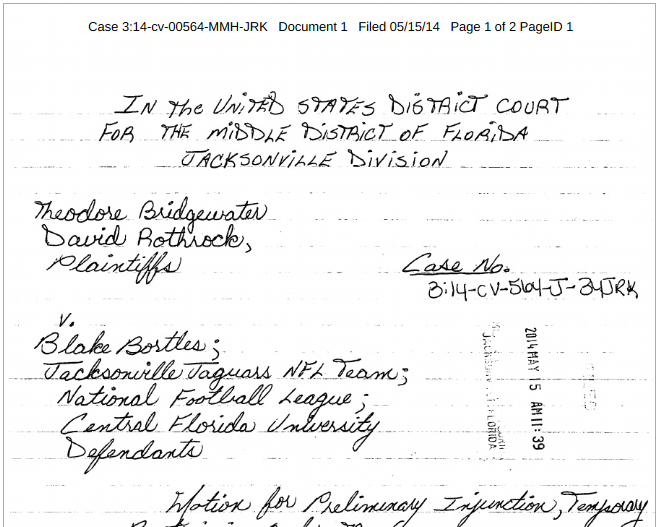A very unusual lawsuit has been filed against Jacksonville Jaguars first round pick Blake Bortles by David Rothrock and “Theodore Bridgewater”, from a prison in Pennsylvania:

A bizarre, handwritten restraining order has been filed against Jacksonville Jaguars first-round pick Blake Bortles and the NFL in a Central Florida court in what appears to be an attempt to bar Bortles from playing for the Jaguars and in the National Football League.
The plaintiffs, listed as “Theodore Bridgewater” and David Rothrock, allege that Bortles is under the influence of steroids and also HIV positive. The lawsuit was filed from a Pennsylvania prison, presumably where Rothrock is incarcerated, and lists the co-plaintiff as “Theodore Bridgewater,” with a P.O. Box in Louisville, Ky., as the address. The plaintiff named on the suit is surely not Minnesota Vikings quarterback Teddy Bridgewater, despite a P.O. Box in Louisville, KY being listed as the address.
The filing not only accuses Bortles of taking steroids and HGH, but also alleges he’s been involved in some other nefarious dealings including an allegation that Bortles framed Rothrock for a crime so he would be jailed and unable to talk to the Federal Bureau of Investigation, who approached Rothrock about the distribution of steroids and HGH.
The plaintiff in the case is representing himself “pro se,” which means he is advocating on his own behalf.
H/T to Vikings Territory for the link.
Update, 23 May. Further proof that anyone can file a lawsuit for almost any reason. This one is against Cleveland Browns first round draft pick Johnny Manziel:
A person has filed for a restraining order against Cleveland Browns quarterback Johnny Manziel and is seeking $25 million in damages, claiming he has sexually harassed a woman for more than a year.
The document, filed in federal court in Florida on May 16, makes numerous salacious allegations against Manziel centered on him allegedly sending nude photos of himself to a woman. It lists a woman’s name on the complaint, but a deputy court clerk in Tampa said the complaint arrived by mail and the court has no way of confirming who sent it. The court clerk, who did not wish to be named, said the filing was mailed in Trenton, N.J.
The document also does not list an attorney, and no other supporting documents could be found in the record in a search by USA TODAY Sports on Friday.
Manziel’s agent, Erik Burkhardt, immediately wrote on Twitter that the complaint is “fake” and “frivolous.”
“It’s insanity,” Burkhardt told USA TODAY Sports. “You can read the thing for yourself.
“What some people will do for publicity is just embarrassing. That’s all I’ve got to say.”



